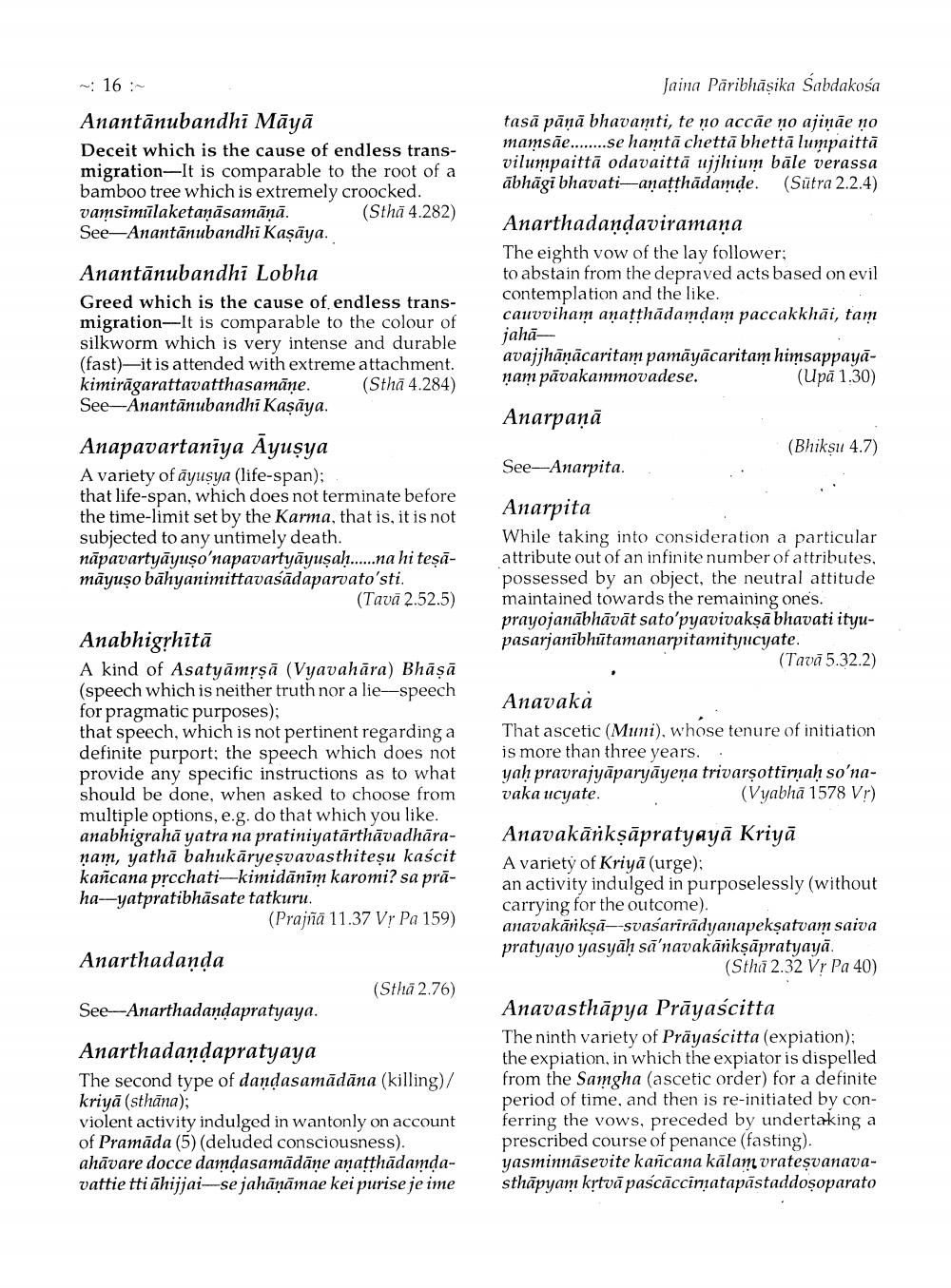________________
Jaina Pāribhāṣika Sabdakosa
- 16 : Anantānubandhi Māyā Deceit which is the cause of endless transmigration-It is comparable to the root of a bamboo tree which is extremely croocked. vamsimülaketanāsamānā. (Sthā 4.282) See-Anantānubandhi Kaşāya.
tasā pāņā bhavamti, te no accãe no ajiņãe no mamsāe........se hamtă chetta bhettä lumpaittā vilumpaittă odavaittā ujjhium bäle verassa ābhāgi bhavati-anatthādamde. (Sutra 2.2.4)
Anantặnubandhi Lobha Greed which is the cause of endless transmigration-It is comparable to the colour of silkworm which is very intense and durable (fast)—it is attended with extreme attachment. kimirāgarattavatthasamāne. (Sthā 4.284) See-Anantānubandhi Kaşāya.
Anarthadandaviramaņa The eighth vow of the lay follower; to abstain from the depraved acts based on evil contemplation and the like. cauvviham anatthādamdam paccakkhäi, tam jahāavajjhāṇācaritam pamāyācaritam himsappayānam pāvakammovadese.
(Upā 1.30)
Anarpaņā
(Bhiksu 4.7)
See-Anarpita.
Anapavartaniya Ayusya A variety of āyusya (life-span); that life-span, which does not terminate before the time-limit set by the Karma, that is, it is not subjected to any untimely death. nāpavartyāyuşo'napavartyāyusah....na hi teşāmāyuso bāhyanimittavasādaparvato'sti.
(Tavā 2.52.5)
Anarpita While taking into consideration a particular attribute out of an infinite number of attributes. possessed by an object, the neutral attitude maintained towards the remaining one's. prayojanābhāvāt sato'pyavivaksā bhavati ityupasarjanibhūtamanarpitamityucyate.
(Tavā 5.32.2)
Anabhigrhītā A kind of Asatyāmışā (Vyavahāra) Bhāṣā (speech which is neither truth nor a lie--speech for pragmatic purposes); that speech, which is not pertinent regarding a definite purport; the speech which does not provide any specific instructions as to what should be done, when asked to choose from multiple options, e.g. do that which you like. anabhigrahā yatra na pratiniyatārthāvadhāranam, yathā bahukāryesvavasthitesu kaścit kañcana prcchati-kimidānim karomi? sa prāha-yatpratibhāsate tatkuru.
(Prajmã 11.37 Vy Pa 159)
Anavaka That ascetic (Muni), whose tenure of initiation is more than three years. yah pravrajyāparyāyeņa trivarsottirnaḥ so'navaka ucyate.
(Vyabhā 1578 Vr)
Anavakāňkşāpratyayā Kriyā A variety of Kriyā (urge); an activity indulged in purposelessly (without carrying for the outcome). anavakārikşa--svasarirădyanapekṣatvam saiva pratyayo yasyāḥ sā'navakārkṣāpratyayā.
(Stha 2.32 Vr Pa 40)
Anarthadanda
(Sthā 2.76)
See-Anarthadandapratyaya.
Anarthadandapratyaya The second type of dandasamādāna (killing)/ kriyā (sthāna); violent activity indulged in wantonly on account of Pramāda (5) (deluded consciousness). ahāvare docce damdasamādāne anatthādamdavattie tti āhijjai-se jahāņāmae kei purise je ime
Anavasthāpya Prāyaścitta The ninth variety of Präyascitta (expiation); the expiation, in which the expiator is dispelled from the Samgha (ascetic order) for a definite period of time, and then is re-initiated by conferring the vows, preceded by undertaking a prescribed course of penance (fasting). yasminnasevite kañcana kālam vratesvanavasthāpyam kịtvā pascāccimatapāstaddoşoparato




